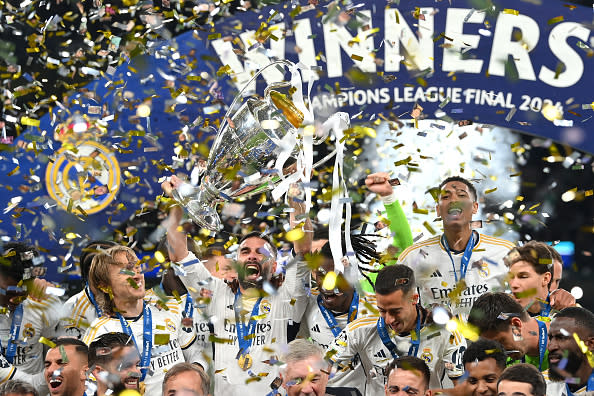Is Real Madrid’s Champions League win proof of football’s predictability problem?

As the gaps widen between football’s haves and have-nots, Real Madrid’s not unexpected 15th Champions League win ought to set off alarm bells.
It’s a dichotomy that runs through the heart of elite sport. Do we want more Usain Bolts, Serena Williamses and Tiger Woods; superstars whose mere presence is close to a guarantee of winning? Or more Leicester Citys, Emma Raducanus and Buster Douglases; rank outsiders who defy the odds? In other words, when does predictability become a problem?
Football must now wrestle with that question after Real Madrid won the Champions League yet again on Saturday night at Wembley. It was their 15th in total, more than twice as many as the next most successful European club. And that’s now six in 11 years, a run of consistent success that shouldn’t be possible in a knockout competition. But the Spaniards keep writing their own rules.
And they’re not alone. Manchester City have won six of the last seven Premier League titles, while Paris Saint-Germain have won nine of the last 11 editions of Ligue 1. In Germany, Bayern Munich’s sequence of 11 consecutive Bundesligas has just ended, while Juventus recently won nine Italian championships on the bounce. As outcomes become more common, mutterings grow louder about whether this is, in fact, what we want.
Money is at the heart of the debate. While funding is by no means a guarantee of trophies, there is a clear correlation between how much teams spend on wages and their resulting league position. And it is no coincidence that the teams mentioned above have tended to have larger wage bills than their peers.
There’s a virtuous cycle at play. The more you win, the more you earn, the more you can pay, and so the more likely it is that you go on winning. In US sports, the draft system ensures competitive balance by giving a leg up to last year’s losers. In European football, on the other hand, the trend is towards the biggest clubs receiving more and more in central revenues, reinforcing the commercial advantage that they already hold.
A counter argument to fears about predictability is that sport is cyclical. We are simply in the era of Real Madrid winning Champions League titles and Manchester City being the best team in England. They might win again next year, but history says it won’t – can’t – last forever.
It might also be argued that focusing on money does the managers who mastermind such sustained glory a disservice. That Carlo Ancelotti and Pep Guardiola are geniuses – which they are – and that their achievements deserve to be celebrated, not undermined by hand-wringing over their domination (or, in City’s case, alleged rule breaches, but that is a separate discussion).
But it feels important to address this now because football is in a time of profound change off the field. A new-format Champions League begins next season with increased revenues which will only increase the gap between those clubs who get to play in it and the majority who do not. The expanded Club World Cup is sure to have the same effect.
In England, in-fighting between the Premier League and EFL over the disparity between the top flight and second tier has in part led to the creation of an independent football regulator. Rishi Sunak’s snap election call means the regulator is on hold again for now but likely to return to the agenda in the autumn, when its proposed powers could yet be increased or reduced.
Meanwhile, all top leagues are seeing media rights value stall or decline following years of growth. The new-look Champions League is an exception but, like the Premier League, Uefa has made ever more games available for broadcast in a bid to keep income trending upwards. Football can ill afford losing viewers right now because it is too predictable.
Will anything be done to redress the balance? It comes back to what we want from elite sport. But it looks unlikely in the short term, and if the current trajectory remains then don’t be surprised if Real Madrid and Manchester City are celebrating again next year and the year after, because the odds of another Leicester City are only going to get more remote.

 Yahoo Finance
Yahoo Finance 